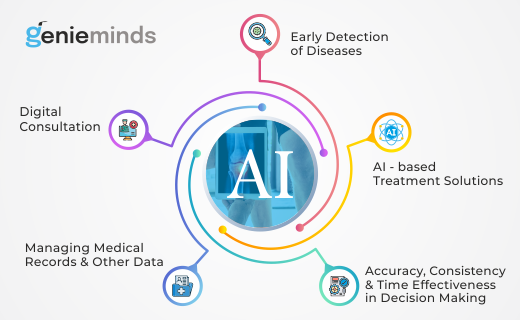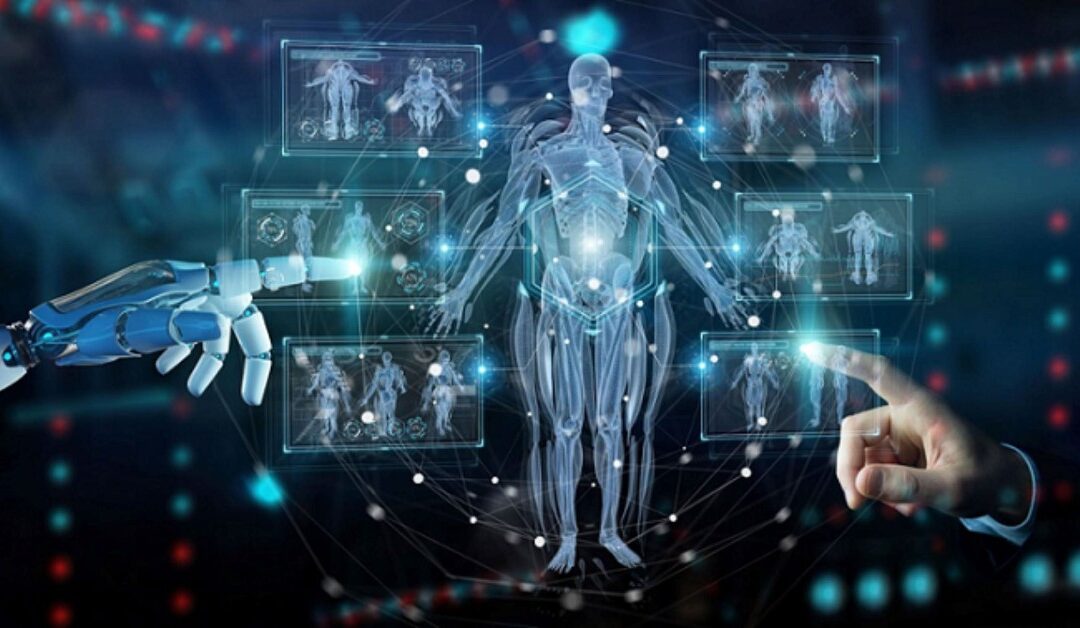As is rightly said, “The coming era of Artificial Intelligence will not be the era of war, but the era of deep compassion, non-violence, and love.” The efficiency of any product depends on how we use it, in a positive way or in a destructive way. Is there any field untouched from the Midas Touch of AI? Nowadays, we want everything fast and within our reach. And the reality is that in today’s digitized era, every field is getting impacted with AI. How can the medical field then stay away from this?
The practice of medicine is getting transformed with the aid of AI. It is actually helping doctors to cure patients more accurately, consistently, while reducing treatment time and resulting in a better medical outcomes.
Let’s see the top 5 reasons for AI Implementation in Medical Diagnostics.
1. Early Detection of diseases
The time of its detection is indeed most important to treat the disease and save life. Most diseases like cancer needs treatment at very early stage to avoid future complications and suffering. In many cases, the diagnosis is unfortunately made too late and doctors can no longer help as much as they could’ve, as patients often ignore basic symptoms and procrastinate doctor visits.
Applying AI to medical diagnosis provides many benefits to the evolution of healthcare industry. AI-based software can tell whether a patient has a certain disease even before evident symptoms appear. For E.g. A recent study published in the Journal of the National Cancer Institute shows that the AI system has achieved a breast cancer detection accuracy comparable to an average radiologist.1
AI is expected to help with this major problem in the future. Several studies show that AI can assist in the early detection of pancreatic cancer, Alzheimer’s disease and heart attacks in future times.
Well trained algorithms can provide increasingly consistent results with expected accuracy. This can help medical professionals rely more on observations / findings provided by the AI enabled system. Of course, AI definitely cannot replace doctors but with proper algorithms and structures, far better clarity can be acquired.
2. AI-based treatment solutions
As mentioned earlier, AI will definitely aid in reducing the detection time and therefore curing time for deadly diseases like cancer, heart attack and Alzheimer’s disease. Patients, who are often embarrassed to reveal problems to a therapist (e.g mental health issues) they’ve never met before, find it easier to let down their guard with AI-powered tools. They collect and analyze reams of data much more quickly than humans could and then suggest effective ways to treat patients.
Even when a disease is detected and classified, the treatment process can cause additional issues. Modern AI algorithms already help doctors arrange a comprehensive approach to disease management viz. Prescribing medicines and exercises, coordinating care plans, helping patients manage their treatment programs, following up with patient and consider the risk of an adverse event.
3. Accuracy, Consistency and Time Effectiveness in Decision making
Unlike humans, AI never needs to sleep. Systems can work round the clock, and provide just-in-time responses in emergency situations. They can be accessible to medical professionals working in remote or rural areas at any point in time.
With advances in software, hardware, and related algorithms, the accuracy of results achieved is increasingly at par compared to experienced medical professionals.
Additionally, the time required to generate results is comparatively very less in cases where large amounts of data/cases need to be processed. This improves efficiency of operations and aids swift decision making in a hospital setup.

4. Managing Medical Records and Other Data
Traditionally, health records would be stored in paper works and filed for future references. But we have certain limitations regarding the same. For editing any data, it would be necessary to make a completely new file unlike when data is stored in digital format. Finally, in case these records were lost, it would be difficult or impossible to retrieve them due to a lack of backups.
For effective healthcare data management, AI optimizes data storage in many ways by using sophisticated algorithms and techniques to process medical data to perform various healthcare-related decision-making processes. Cloud storage can help hospitals store large quantities of data in only one system. In addition, these cloud services have data backup where it is possible to retrieve any lost information. It is also possible to modify the medical data without altering any other record elements when storing it in a system.
5. Digital Consultation
Digital consultations are able to offer quicker and wider solutions in complicated clinical cases, assist lesser trained staff with more accurate diagnoses and/or provide second opinions as required.
Speedy diagnosis leads to speedy treatment which eventually provides greater chances for the patient to avoid severe consequences like poor prognosis, disability or death. The introduction of digital consultations routinely carried out can thus help medical specialists in not only saving time and easing their daily work but also achieve higher accuracy and much improved patient outcomes. A great example of this is the new “breakthrough” solution in the form of the CT Stroke Service. This is a model based on AI algorithms that determines the type and location of the stroke-zone and automatically marks the CT images, reducing the crucial processing time for each image by several minutes.
References: Journal of the National Cancer Institute

